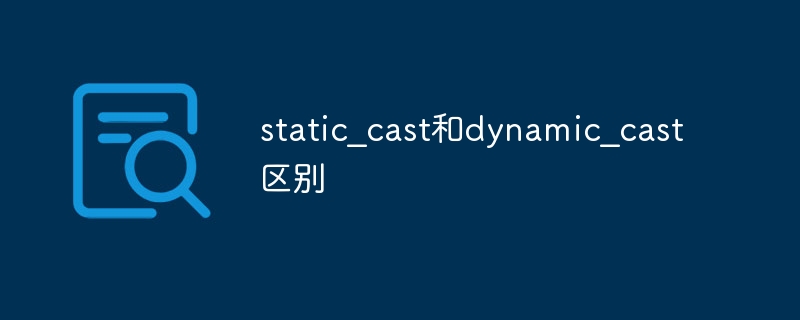
In C, the difference between static_cast and dynamic_cast is: Security: static_cast is a static type conversion without runtime checking, which may lead to undefined behavior; dynamic_cast is a dynamic type conversion, which is checked at runtime to ensure The converted types are compatible and safer. Application scenarios: static_cast is used to convert compatible types and pointers/references; dynamic_cast is used to convert incompatible types and polymorphic scenarios. Result: static_cast always returns the value of the target type; dynamic_cast only returns the value of the target type when the conversion is successful, otherwise it returns nul

##static_cast and dynamic_cast The difference
In C,static_cast and dynamic_cast are both operators used for type conversion, but there are significant differences between them .
1. Type safety
is a static type conversion that is performed at compile time. Therefore, it does not perform any runtime checks and is therefore unsafe, possibly leading to undefined behavior.
is a dynamic type conversion that occurs at runtime. It performs a run-time check before performing the conversion to ensure that the target type is compatible with the source type. Therefore, it is much safer than static_cast.
2. Application scenarios
static_cast Mainly used for:
dynamic_cast Mainly used for:
3. Result
always returns a value of the target type, even if The conversion was unsuccessful.
Returns a value of the target type only if the conversion is successful. If the conversion fails, nullptr is returned.
Example
<code class="cpp">// 实例化一个基类对象 Base* base = new Base(); // 使用 static_cast 转换基类指针到派生类指针 Derived* derived1 = static_cast<Derived*>(base); // 潜在的未定义行为 // 使用 dynamic_cast 转换基类指针到派生类指针 Derived* derived2 = dynamic_cast<Derived*>(base); // 返回 nullptr,因为 base 不是 Derived 类型的对象</code>
Conclusion
static_cast and dynamic_cast Has different roles and safety in type conversions. static_cast is used for fast, unsafe, compile-time conversions, while dynamic_cast is used for safe, run-time conversions. It is crucial to choose the appropriate operator based on the type and requirements of the conversion.
The above is the detailed content of The difference between static_cast and dynamic_cast. For more information, please follow other related articles on the PHP Chinese website!
 What are the differences between c++ and c language
What are the differences between c++ and c language
 Recommended learning order for c++ and python
Recommended learning order for c++ and python
 Cost-effectiveness analysis of learning python and c++
Cost-effectiveness analysis of learning python and c++
 Is c language the same as c++?
Is c language the same as c++?
 Which is better to learn first, c language or c++?
Which is better to learn first, c language or c++?
 The difference and connection between c language and c++
The difference and connection between c language and c++
 C++ software Chinese change tutorial
C++ software Chinese change tutorial
 Cost-effectiveness analysis of learning python, java and c++
Cost-effectiveness analysis of learning python, java and c++




